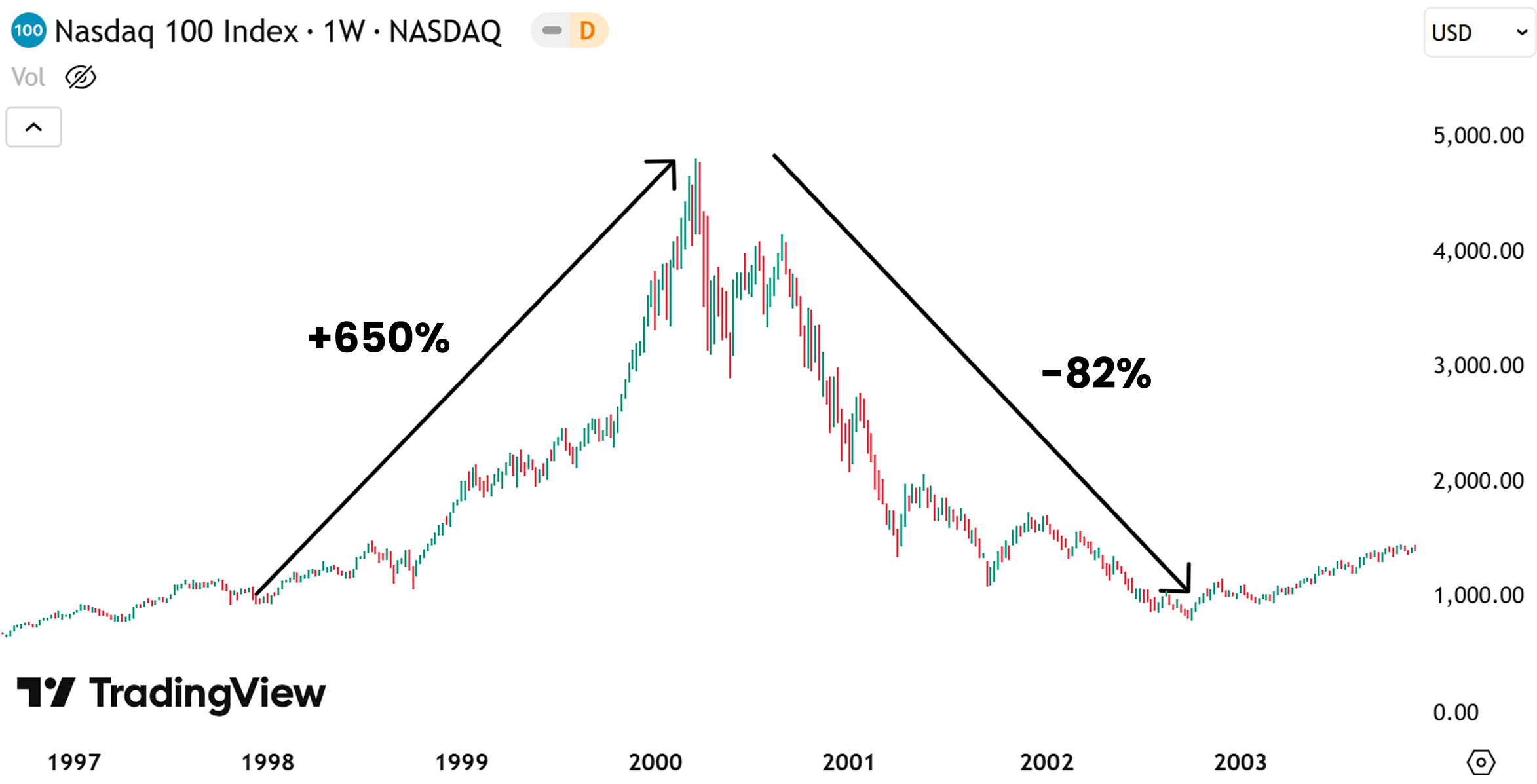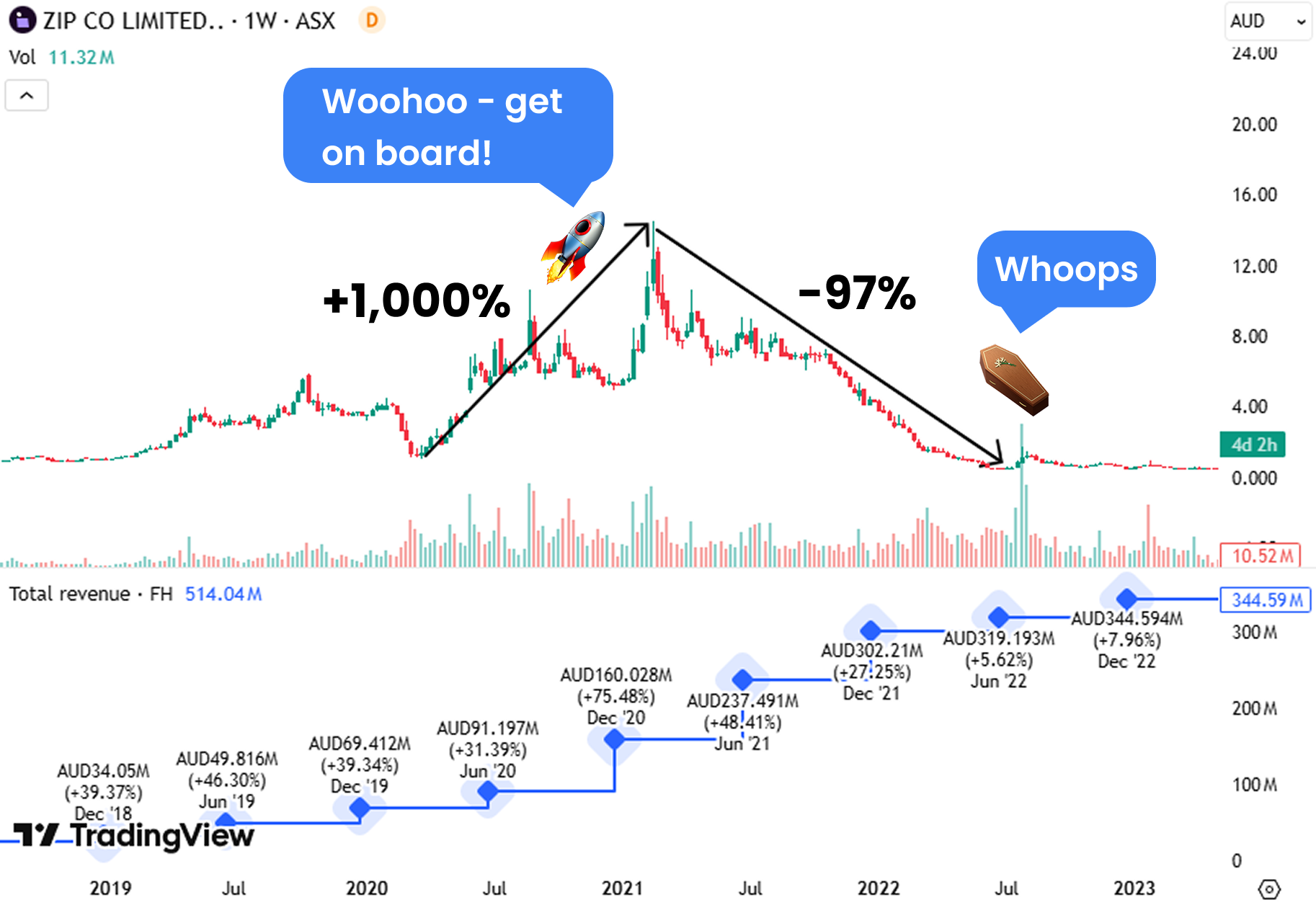The Mistake Every Beginner Makes in the Stock Market
Everyone makes mistakes. But in the stock market, those mistakes can set you back significantly if you're not careful.

Experience is making mistakes and learning from them. - Bill Ackman
I bought my first stock when I was 15 and, as you can imagine, I made many mistakes.
Each of these mistakes had a price, but the losses were outweighed by the valuable lessons I learned from them.
Luckily for you, I'm here to tell you all about those mistakes so you can avoid making them and hopefully save some money.
This article was originally titled "Top 5 Mistakes Beginners make…", but while writing I realised that most could be boiled down to just one.
So without further ado the biggest mistake beginners make in the stock market is:
✨ Investing Emotionally ✨
Investing is naturally a very emotional process since it involves putting your hard-earned money on the line.
You feel excited when your stocks go up and frightened when your stocks go down.
But to be a successful investor, you have to put those emotions aside and make decisions objectively.
This is much easier said than done.
In his book, Fooled By Randomness, Nassim Nicholas Taleb explains a study that was done on patients who had damage to the part of their brain that registered emotions. You would think that without the ability to feel emotion these patients would be perfectly objective, rational beings.
In reality, the subjects in this study were incapable of making decisions altogether, including the decision to simply get out of bed in the morning.
The study showed that, as humans, it is not actually possible for us to make decisions without involving our emotions.
Our emotions help us make decisions quickly. We don't have time to conduct the complex mental calculations required to make perfectly objective decisions, so instead we rely on our emotions.
If there ever was a perfectly rational human being, they died long ago because they spent too long assessing the danger when confronted by a lion. It was their caveman brother who ran immediately out of fear and survived to pass his genes onto us.
To make things worse, the stock market is full of noise. Even if we could process all the available information, it wouldn't necessarily help us predict what will happen next with any meaningful degree of accuracy.
Since you and I don't have access to an all-powerful supercomputer to make decisions for us, we are stuck with our flawed and emotional human brains.
The Fear of Missing Out (FOMO)
One of the most common and detrimental expressions of emotional investing is the fear of missing out (FOMO).
You've likely felt FOMO when you couldn't make it to a party that all your friends were going to. You'd think about all the fun your friends would be having and how much better it would be if you were there. The same thing happens in the stock market!
On your investing journey, you will inevitably hear about other stocks making a lot of people very wealthy. At these times, it is only natural to feel jealous. You imagine how much money you could have made if only you had bought it earlier, only to see it continue going up and up. You perceive your own wealth as getting less and less in comparison to the alternate reality in which you bought the stock. Eventually you decide enough is enough and buy the stock on nothing but hope, only for it to came crashing down.
I have seen this happen to everyone, including investment professionals (seriously, it happens to everyone).
A famous example of this is the dot-com bubble of the late 1990s. Due to the excitement around the invention of the internet, investors piled into related stocks which caused their price to skyrocket. The incredible returns on these stocks attracted more investors out of fear of missing out.

Prices became so disconnected from fair value, startups with no income would list at astronomical valuations just because they had ".com" in their name.
The dot-com bubble is an extreme example of emotional investing, but it happens on a smaller scales all the time.
Here's an example of FOMO toward an individual stock, Zip (ZIP).
From March 2020 to February 2021, buy now pay later was taking off. Zip's stock increased from $1.20 to over $14.00 (over 1,000%), far outpacing the growth of its underlying business.
Of course, the hype ultimately passed and the stock crashed back down to earth.

How to Avoid Investing Emotionally
1. Invest in what you know
Invest in what you know. - Peter Lynch, One Up On Wall Street
Peter Lynch is a renowned investor and author who managed the Magellan Fund from 1977 to 1990. He achieved a legendary average annual return of 29.2% during his time at the fund.
His investing philosophy was to "buy what you know."
Some of Lynch's best investments were Dunkin Donuts, Taco Bell, and Volvo, companies you and I are probably already familiar with.
This philosophy may seem simple, but it's essential to investing objectively.
Investors tend to overcomplicate things and end up buying businesses they know nothing about: companies with the latest cutting-edge technology, patent-pending medical research startups, or mineral exploration companies on the verge of discovering the next Olympic Dam
Lynch likens this to playing stud poker without knowing the cards you hold. Yes, you can get lucky and make a lot of money with stocks like these. But that's all it is - luck.
The problem with investing in these stocks is that you have nothing to base your decisions on.
If the stock goes up 20% how will you know what to do? Should you sell because this is as far as the stock has to go? Or should you buy more because whatever the company is doing must be working and the stock has much further to go?
You can learn about Lynch's investing philosophy here.
2. Stick to a plan
A goal without a plan is just a dream. - Brian Tracy
Sticking to a plan is essential to being objective and therefore being successful in the stock market.
An investment plan is a set of rules you will follow to make investment decisions and ultimately achieve your financial goals.
When creating your investment plan, ask yourself the following questions:
- Why am I investing? Are you investing to retire early? To buy a house? Or generate passive income?
- What will I invest in to achieve my goal? Will you buy ETFs or individual stocks? If individual stocks, what sort of stocks will you buy?
- How much will I invest?
- How often will I invest?
- When will I sell my investments?
Once you have answered these questions, write your plan down in dot points and refer to it whenever you need to make an investment decision.
An example of an investment plan is:
- I am investing to retire early.
- I will buy the stocks of established, well-known companies with consistent EPS growth and a market cap of at least $10B (a.k.a. blue chip stocks 💎).
- I will buy them when the PE ratio is below 25.
- I will sell them when they no longer meet the above criteria or the PE ratio is above 30.
Let's look at an example to see exactly why having an investment plan is so important.
Imagine you bought a stock at $10 with a plan to sell it at $12 when you've made 20% profit.
The stock makes it to $12 and you decide to sell according to your plan. One of two things could happen:
- The stock falls and you were glad to sell it at the higher price.
- The stock continues to rise and you miss out on further profit.
In the second scenario, it's easy to beat yourself up over the missed profit. But no one can predict the market with certainty and you had no way of knowing that the stock would continue to rise. Even though the outcome was suboptimal in this situation, you made the more important decision which was to stick to your plan.
The only thing that works over the long-term is to apply a consistent and disciplined investment strategy.
This article is intended for educational purposes only. The information provided is general in nature and does not consider your personal financial circumstances. Please consult a certified financial advisor if you require advice.